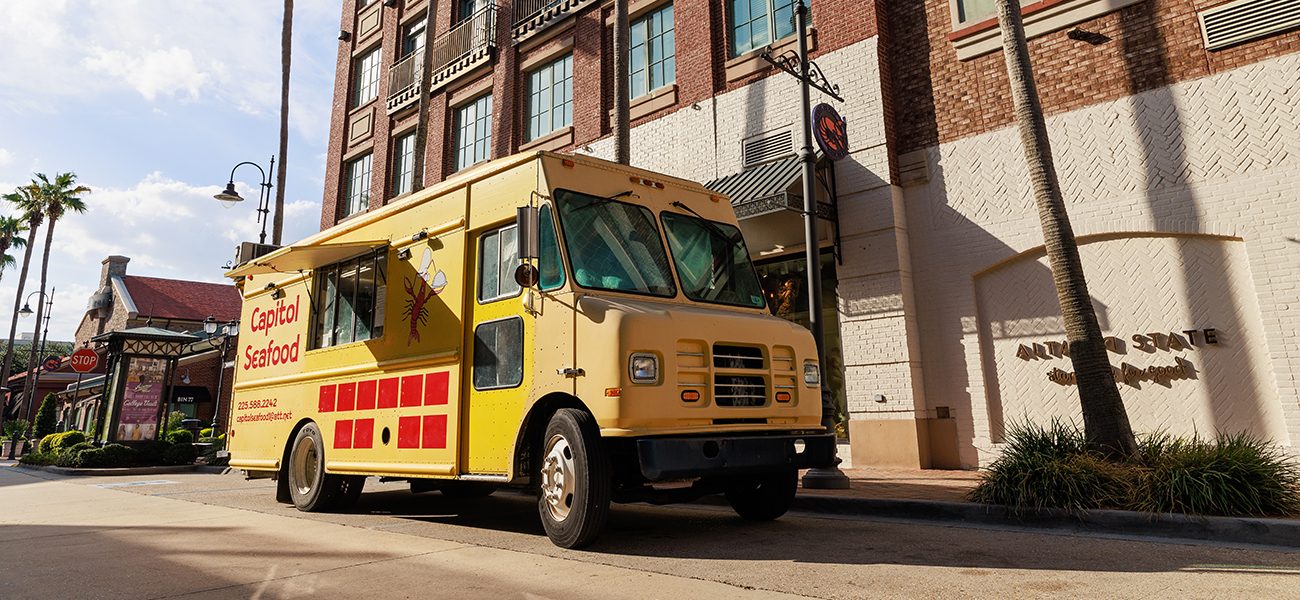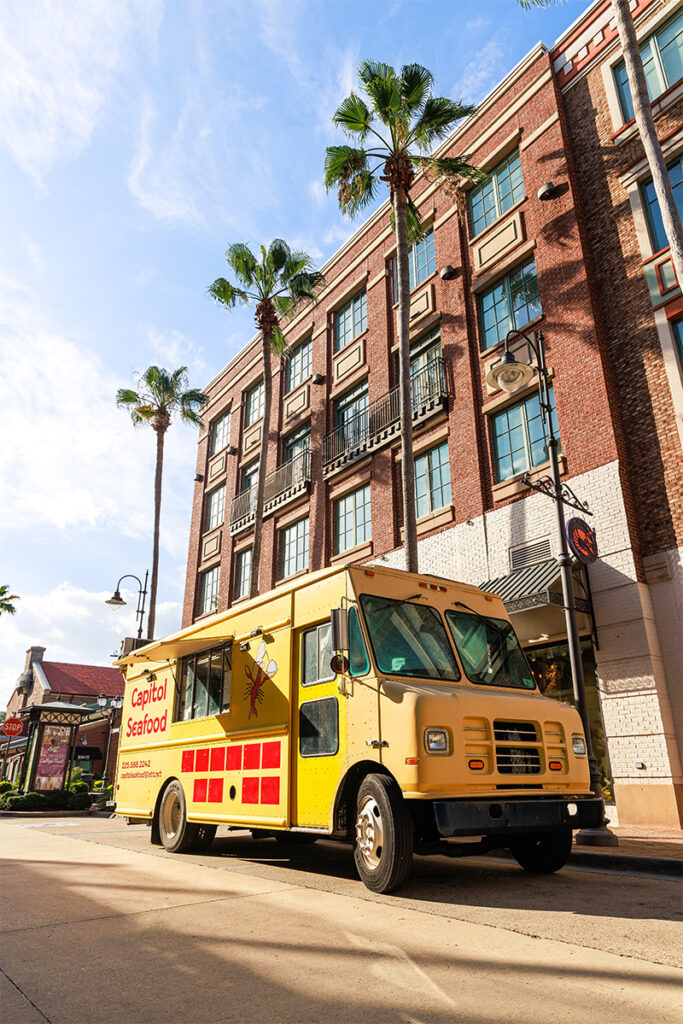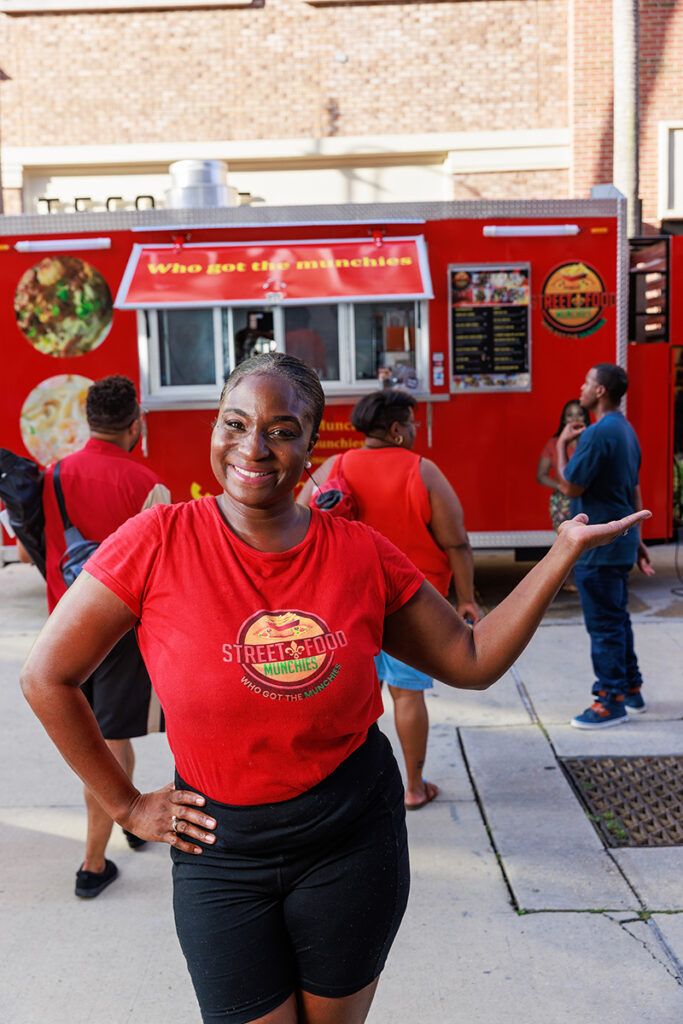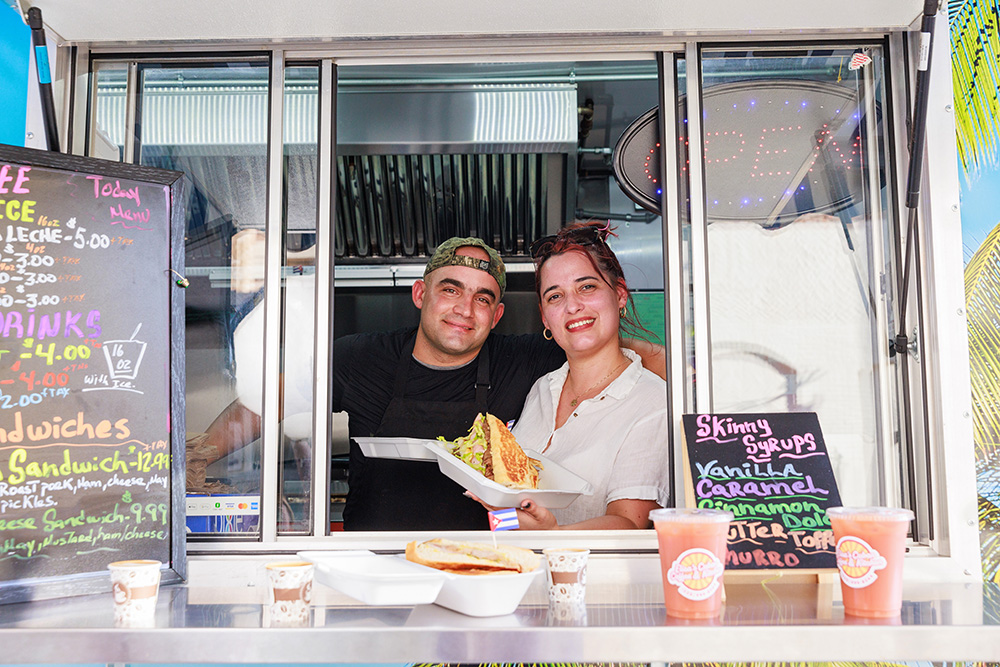
How do food trucks fit into Baton Rouge’s current culinary landscape?
This article was originally published in the October 2023 issue of 225 magazine.
Should she open a food truck or a restaurant? The choice was easy for Elisa Valera.
Running a mobile eatery meant limitless places where she could serve her food. It meant a chance to introduce the cuisine from her native Cuba to as many people as possible.
“Even though the Cuban sandwich is so popular, many people in Louisiana don’t know about other Cuban sandwiches or coffee,” she says. “I want people to know about the culture, the flavors.”
And on a steamy evening this past August, her truck had a wide audience. Elisa’s Cuban Coffee and Kitchen was one of about a dozen restaurants-on-wheels parked at the Food Truck Round Up at the Rowe.
Three times per year, the event shuts down the streets of Perkins Rowe. About 1,200 diners regularly flock to the mixed-use development for a taste of everything from barbecue to Caribbean-style mojo chicken. This summer’s 100-degree temperatures didn’t stop the shoulder-to-shoulder crowds.
“The commitment is unreal,” says Perkins Rowe marketing manager Chelsea Thibodeaux. “At times there have been so many people, you couldn’t even move.”

1,200
Number of diners who regularly attend the Food Truck Round Up at the Rowe
In fact, Thibodeaux says she has yet to encounter any weather that discourages people from missing the event, even in chilly February and notoriously rainy June.
When Thibodeaux and her team started the Round Up back in 2017, she says she expected to book six or seven trucks. Now, the Friday evening events have gotten so popular, she keeps a waitlist of eager vendors. She books a maximum of 12 to 14 trucks, depending on the trailers’ sizes.
She thinks people are drawn to the Round Up because of the diverse mix of menus. It’s an opportunity to try a wide range of dishes in one night.
That diversity is perhaps why Baton Rouge’s food truck scene has had such staying power over the past decade and a half. The city’s volume of mobile eateries has ebbed and flowed over the years and the seasons—booming during the socially distant days of COVID-19 or a busy festival season before tapering back off.
Nearly two decades since food trucks became a national trend, Baton Rouge’s food truck scene may never look like Austin’s with Airstream-filled food truck parks on every corner.
But in the past couple years, Baton Rouge has settled into a healthy, steady landscape of new and longtime offerings.

“If you make good quality food, people will come back.”
—Lataoya Jett, owner of Street Food Munchies
On weekdays at lunchtime, handfuls of food trucks congregate in busy neighborhoods like downtown or LSU. They camp outside of office buildings and schools.
But the city’s true sweet spot for food trucks seems to be in events. Trucks are now driving beyond city limits for new monthly and annual food-truck roundups in nearby Port Allen, Gonzales and Denham Springs.
It’s allowed for a culinary cross pollination of cities and regions, while simultaneously giving budding food entrepreneurs a chance to dip their toes into the industry.
Local healthcare analyst Lataoya Jett launched her flatbread and loaded-baked-potato eatery, Street Food Munchies, last year. She parks it downtown for lunch five days a week, feeding crowds of 40 to 50. And she says she’s landed a gig catering for LSU Football players before a game this fall.
“Running the truck is hard work. It takes persistence. You really have to have a passion for it,” Jett says. “But if you make good quality food, people will come back.”

Cheryl Whitesell, who owns the Geaux Yo dessert truck, leveraged her brand to open a brick-and-mortar frozen yogurt shop in Central last fall. She likes the fast pace of running a food truck, but she says there are other challenges.
Geaux-Yo’s two large soft-serve machines fight to keep the dessert at a cool 28 F, even as the truck’s kitchen reaches temperatures of 85 F to 90 F on hot days.
“We bought the biggest generator available, and even then, we max it out all the time,” she says.
During the Round Up, her fro-yo began melting the millisecond she handed it out the window. But that didn’t impact the ear-to-ear grins on the faces of the children she handed it to.
“Ice cream makes everybody happy,” she says. “Everybody wants frozen yogurt or something cold.”
The joy of tasting something new is why people drive across town to random parking lots to track down their favorite truck.
And it’s why people come to an outdoor event like the Round Up in a heat advisory.
Valera couldn’t stop beaming each time she reached out the window to hand a customer a cafe con leche that night.
Starting her food truck last year fulfilled a longtime dream. She moved to Baton Rouge about seven years ago shortly after emigrating from Cuba. As she learned English, she fell in love with Louisiana food, as she saw how it could be a language of its own. She wanted to share her own culinary heritage with her new home.

She found a food trailer through Facebook Marketplace. It was already outfitted with kitchen equipment, so she got to work designing the menu, booking health inspections and getting licensed by the city.
“In the beginning, it was so hard. I didn’t know where to go, so I reached out to literally every festival. I would send them pictures of the trailer and food,” she says. “But now, people reach out to me about the truck.”
The Round Up is one of many Valera travels to when her food truck isn’t parked in downtown Baton Rouge for weekday lunch. She’s taken it to pop-ups and festivals all over town and has even ventured to places like Denham Springs and greater New Orleans.
The key to her food truck’s success, she says, has been simplicity: Keeping a smaller, more curated menu of dishes makes it easier to execute. She and her husband, Jose Peña, make different kinds of sandwiches and tamales on the grill, occasionally experimenting with specials.
“We came here for a better life. … Now, I feel so happy serving the customers,” she says. “I don’t feel like I ever work when I work in the food truck. It’s the best thing I could have wished for.”
Although the taste of running a food truck has already given her a new dream.
Now, she is thinking about planting roots with a brick-and-mortar.
Food truck startup checklist
✅ Find and outfit a trailer for food service.
Equip the truck with kitchen equipment and A/C, register it in Louisiana (like any other vehicle) and obtain auto and liability insurance.
✅ Plan the concept.
The food truck will need a menu, branding and marketing (including an active social media presence).
✅ Pass health inspections.
Register for a Mobile Food Truck Permit with the Louisiana Department of Health. Call 225-242-4870 for assistance.
✅ Register with the city.
Submit a Business Registration Application with a copy of the permit issued by the Department of Health to the Mayor’s Office. A City-Parish Occupational License fee is $200. City-Parish Revenue will then issue an Itinerant Vendor license, which will need to be renewed annually.
✅ Figure out where to park.
Fees will vary by location and event. (Downtown, for instance, requires paying the meter for up to two hours.) Be sure to share the truck’s daily location and hours on social media.
|
|
|

